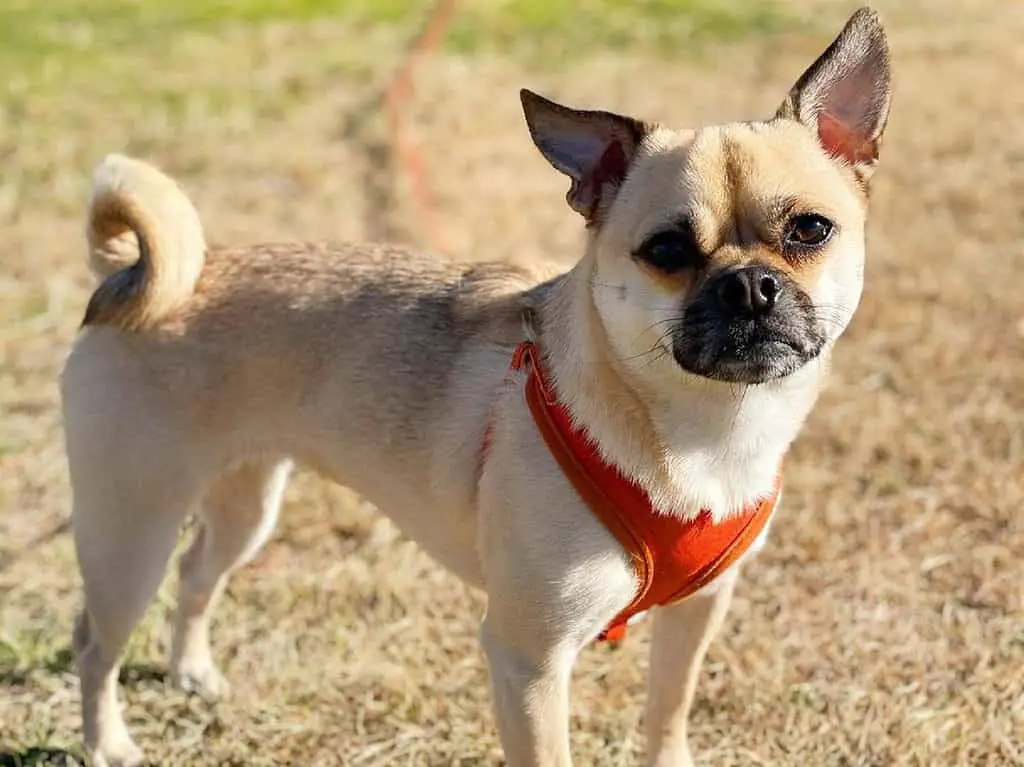If you’re considering adding a Chug to your family, you should know some essential things about this breed.

1. Can Chugs live with other pets?
Chihuahuas are typically known to thrive in single-dog households, whereas Pugs have a fondness for the company of other pets and take satisfaction from social encounters.
If your Chug pup takes after its Chihuahua parent, he should receive appropriate early sociability and discipline techniques, as this will assist him in becoming accustomed to other animals.
We recommend keeping your Chug with cats and less energetic dogs, as larger, more playful canines may inadvertently injure your Chug f they become too enthusiastic during playtime.
2. Do Chug dogs bark a lot?
Chugs, being typical of small dogs, tend to bark intermittently. This behaviour can be beneficial because they alert their owners of potential strangers or unusual occurrences, making them well-suited for guarding. However, a barky Chug Chug may disturb nearby neighbors.
On the bright side, you can train your Chug when and where it’s appropriate for her to use her little voice. Take time each day to practice clear commands like ‘speak’ or ‘quiet’ so your pup will know what is expected from them.
3. Are Chug dogs prone to obesity?
Though they are small, these dogs are known to indulge in excessive eating habits, so it’s imperative to provide Chugs with a diet tailored for smaller breeds. Refrain from purchasing dog foods that can lead to unhealthy weight gain in your pet.
4. Do Chugs suffer from separation anxiety?
Both the Chihuahua and the Pug were selectively bred for their ability to form strong attachment bonds with humans; thus, their offspring are expected to do so as well..
While this is admirable, the Chug’s tendency to experience separation anxiety can cause difficulties for owners with irregular or busy schedules. Left unchecked, this distress can manifest in destructive behavior.
5. Do Chug dogs make great travel companions?
Their diminutive size allows Chug dogs to accompany their owners on long journeys, including by car and plane, making them great travel companions.
6. Do Chug dogs do well with extreme temperatures?

The brachycephalic characteristics of the Pug Chihuahua Mix result in respiratory complications that become exacerbated in intensely cold and hot environments. It is, therefore, most beneficial to reside in areas with moderate climatic conditions for this breed.
In areas of low temperatures, it is essential that Chugs are clothed with appropriate outerwear, such as coats or sweaters, when they go outside.
7. Are Chugs apartment-friendly?
The Chug is an excellent choice for those living in an apartment setting. Its small size makes it suitable for even the smallest of dwellings.
8. Should I clean my Chug’s wrinkly face regularly?
Yes, you should ensure that the folds in their face remain free of moisture and dirt. Doing so will help minimize bacterial growth, odor, and discomfort.
Read our Chug (Aka Chihuahua Pug Mix) Dog Breed Profile for a detailed guide on how to care for this breed.
9. Do Chug dogs have short attention spans?
Yes, Chug dogs have short attention spans. As a result, it can be difficult to maintain their focus for considerable lengths of time. Keep training sessions brief and enjoyable to maximize their productivity.
10. Is it better to adopt than buy a Chug puppy?
There is no straightforward answer to this question, as each option certainly has its benefits and drawbacks.
On the one hand, when you buy a dog from a breeder, you have more control over your selection process. You can pick Chug puppies from parent breeds with good health and temperament.
When it comes to adoption, the apparent benefit is that you’ll give a dog in need a loving home while also saving money. But suppose you are not adequately prepared to handle the responsibility of adopting a shelter animal. In that case, your commitment and fondness for them will weaken, leaving the vulnerable animal homeless again.
Often, rescued dogs can possess particular behavioural challenges that must be addressed before they can adjust to their new home. Depending on the pup’s age, this could take time, patience, and understanding and consistency from the owner.




